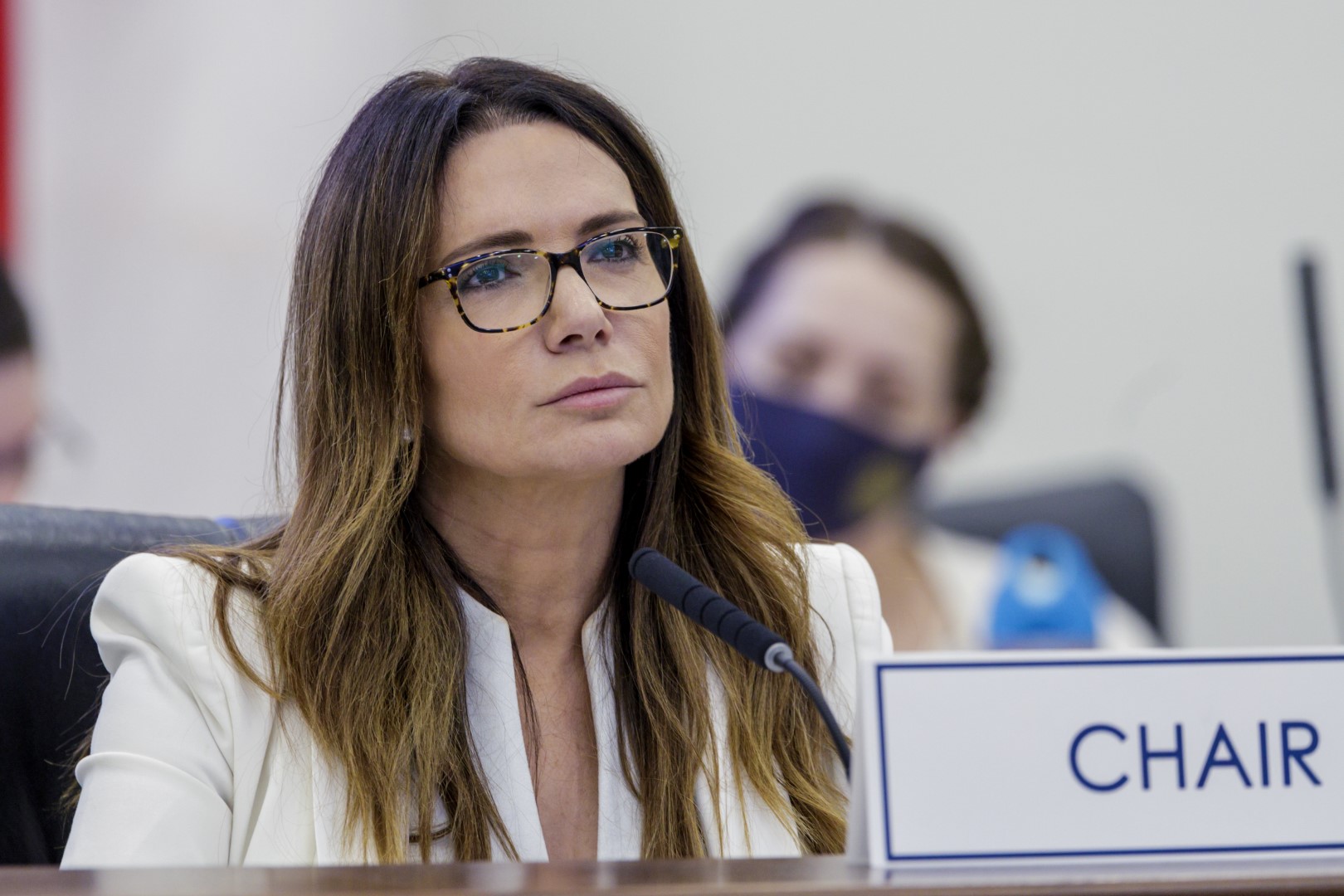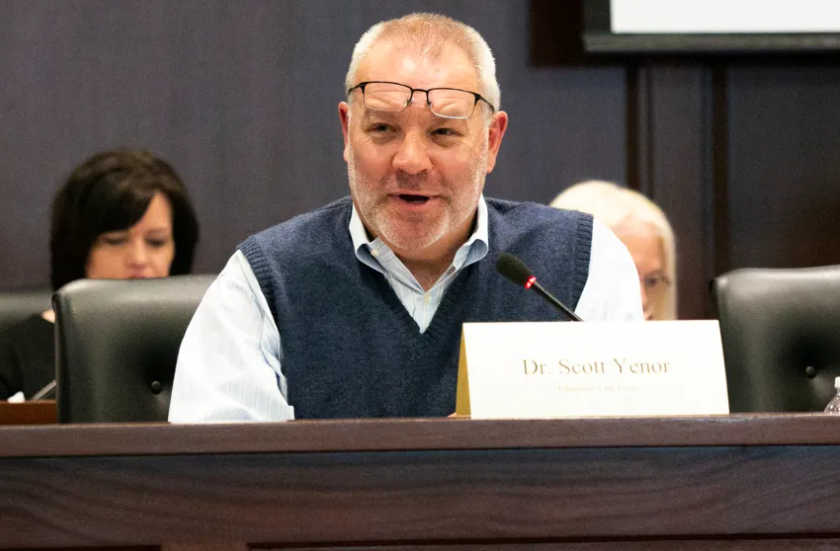A measure by Miami Republican Sen. Ileana Garcia aimed at banning weather modification in Florida cleared its first committee hurdle after some debate, including comments in support of the proposal from the President’s second wife.
The Senate Environmental and Natural Resources Committee voted 6-3 along party lines to advance the bill (SB 56), which Garcia amended to impose far steeper punishments on those who violate its strictures.
Garcia faced questions from her three Democratic colleagues on the panel — Kristen Arrington, Carlos G. Smith and Tina Polsky — about what information she based her bill on, how the state and federal government would handle and divvy up enforcement, and what the cost would be to Floridians.
Garcia said there is ample evidence available online, including on the websites of the White House, World Economic Forum and National Oceanic and Atmospheric Administration showing that weather modification is a long-standing and ongoing practice.
There’s also no shortage of anecdotal evidence, she said, citing countless phone calls her office has received about the matter from residents complaining of unexplained weather phenomena and various health maladies.
Florida today has more than a dozen provisions on the licensing, regulation and control of weather modification meant to cause or disperse rain, snow, fog or other atmospheric conditions. But for the last decade, even though it’s still going on, Garcia said, the state hasn’t received a single license application.
That’s a problem, she said, and Florida needs better information about what’s going on and should provide residents with a way to report any suspicious activity they see.
“Some would call it concerns. Others would call it conspiracy theories. But I thought that perhaps this bill would allow us to start somewhere where we can start to separate fact from fiction,” she said.
“We don’t have a lot of regulations regarding airspace. We place a huge amount of emphasis on water quality control, and I think we should do the same with our air quality (because) not just anybody should be up there playing ‘Raiders of the Lost Ark.’”
If passed, SB 56 or its House companion (HB 477) by Dade City Republican Rep. Kevin Steele would repeal Florida’s existing statutes on weather modification and prohibit the practice outright.
Violators would face fines of $100,000, a sum far higher than the initial $10,000 penalty Garcia had in her bill to begin with. That was already considerably steeper than the usual $500 penalty associated with second-degree misdemeanors, which the violation would be classified as.
Money the state collects from penalizing unauthorized weather modifiers would go into Florida’s Air Pollution Control Trust Fund to establish and maintain a dedicated email, telephone line and online form to facilitate related complaints. The Department of Environmental Protection (DEP) would be tasked with first investigating those complaints, which it then could relay as needed to the Department of Health or Division of Emergency Management.
Garcia said 32 other states have already passed similar legislation. According to the U.S. Government Accountability Office, 10 states have outlawed weather modification — known also as cloud seeding — or were considering such legislation by the end of 2024.
“I’ve been researching,” Garcia said, adding that she has been “tiptoeing” around the issue to avoid using “buzzwords” that trigger immediate skepticism.
“Yet many will complain — a lot of our constituents have — that there’s activity going on, aircrafts flying by, some type of condensation. And let’s call a spade a spade: chemtrails. That’s the term that the conspiracy theorists are coined with,” she said. “But think about what the concerns are: health risks … including respiratory issues. I get a lot of those complaints. Also allergies, environmental impact, concerns regarding possible soil and water contamination, harming wildlife, disrupting ecosystems, government transparency as a whole, government efficiency. It’s in question. It’s in play all the time.”
The concept of chemtrails is a decades-old, debunked belief that contrails, the white lines of condensed water vapor that jets leave behind in the sky, are in fact toxic chemicals that the government and other entities are using to alter the weather, sterilize people or control their minds.
Chemtrails conspiracy theories began circulating in the late ’90s after the U.S. Air Force published a report about weather modification. By 2001, federal bureaucracies had received thousands of communications about the fast-spreading concept, prompting numerous federal agencies and educational institutions to publish fact sheets to address public concerns.
More recently, Tennessee Gov. Bill Lee signed a measure in April banning the “intentional injection, release or dispersion” of airborne chemicals. Six months later, Republican U.S. Rep. Marjorie Taylor Greene of Georgia reignited the argument by declaring on X, “Yes they can control the weather. It’s ridiculous for anyone to lie and say it can’t be done.” Greene’s comments drew censure from both sides of the aisle.
And who is this “they” to which Greene referred? Polsky posed that question during a public comments portion of Tuesday’s meeting to Aimee Villella McBride, one of several speakers representing the Global Wellness Forum who urged skeptics to watch the documentary, “The Dimming,” about alleged efforts to reduce solar radiation through chemical aerosolization.
“I think that was the important (point) of this bill, so we can start to track and have transparency to find out how exactly that is. Is this a state-level contractor? Is this a federal contractor? I don’t think we actually know that,” McBride said.
McBride and others rattled off lists of metals supposedly being injected into the air, including aluminum, barium and silver iodine.
Another speaker, Greg Diehl, said he routinely saw “unusual trails and streaks in the sky left behind by planes” before hurricanes struck the state. No one asked whether the aircraft had possibly been there to monitor or track the approaching storm.
Diehl referenced a 2021 Forbes article detailing a project Bill Gates was backing to support sun-dimming technology to cool the Earth. That effort involved spraying non-toxic calcium carbonate. Diehl also noted that the late pop star Prince discussed chemtrails during a 2011 talk show appearance and that Robert F. Kennedy Jr. has also promoted the idea.
Global Wellness Forum founder Marla Maples — an actress and TV personality who was once married to, and has one child with, Donald Trump — also spoke at Tuesday’s hearing. She lamented an increase in Alzheimer’s disease patients and a possible connection between them and weather modification.
Like McBride, she said the Stand for Health Freedom Foundation, which supports RFK Jr., received 18,000 emails in support of SB 56, and recommended watching “The Dimming,” which has more than 3 million views on YouTube.
“Let’s move this bill through so we can look deeper and find out the best solutions for all of us,” she said.
Asked by Polsky whether she knows anyone in the federal government who could help with the issue, Maples laughed and said, “I sure do.”
Republican Sens. Jason Brodeur of Lake Mary and Blaise Ingoglia of Spring Hill offered slightly different variations of the maxim, “It’s better to be safe than sorry.”
If putting heavy metals into the atmosphere “is good for us, somebody’s going to come tell us,” Brodeur said. “In the meantime, let’s not do that because it doesn’t sound very good.”
“I would rather act on the side of caution,” Ingoglia added.
Arrington, Polsky and Smith remained unconvinced that the measure had been sufficiently contemplated or vetted. Garcia admitted she hadn’t spoken in depth with DEP about her proposal, which could see a massive increase in calls, based on the 18,000 emails previously referenced.
“As a lawmaker, generally I think that before we legislate, we should investigate,” Smith said. “I don’t think it’s a good approach, public policywise, for us to pass the bill first and then see what happens after.”
SB 56, cosponsored by St. Augustine Republican Sen. Tom Leek, has two committee stops remaining. It is to next go before the Senate Criminal Justice Committee.
Post Views: 0


 Entertainment8 years ago
Entertainment8 years ago
 Entertainment8 years ago
Entertainment8 years ago
 Politics8 years ago
Politics8 years ago
 Tech8 years ago
Tech8 years ago
 Tech8 years ago
Tech8 years ago
 Tech8 years ago
Tech8 years ago
 Politics8 years ago
Politics8 years ago
 Tech8 years ago
Tech8 years ago










